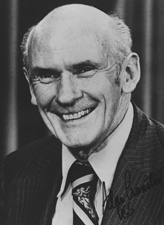Alan Cranston
|
|
Alan MacGregor Cranston (June 19, 1914 – December 31, 2000) was a U.S. journalist and politician. He was born in Palo Alto, California and attended Pomona College and the University of Mexico before graduating from Stanford University in 1936.
He was a correspondent for the International News Service for two years preceding World War II. When an abridged English-language translation of Adolf Hitler's Mein Kampf was released, sanitized to exclude some of Hitler's anti-semitism and militancy, Cranston published an abridged and annotated translation which he believed more accurately reflected the contents of the book. In 1934, Hitler sued him for copyright violation in the state of Connecticut; a judge ruled in Hitler's favour and publication of the book was halted.
Before enlisting in the armed forces in 1944 as a private (he held the rank of sergeant at his discharge), he worked in the Office of War Information. The following year he wrote a second book, The Killing of the Peace, a synopsis of the failed bid to get the United States to join the League of Nations immediately following World War I. Cranston, a supporter of world government, became president of the World Federalist Society in 1948[1] (http://www.antiwar.com/bock/b010301.html). He successfully pushed for his state's legislature to pass the 1949 World Federalist California Resolution, calling on Congress to amend the Constitution to allow U.S. participation in a federal world government.
A Democrat, Cranston was elected California State Controller in 1958 and reelected in 1962. In 1968, he was elected to the first of what would prove to be four six-year terms United States Senate, defeating Republican Max Rafferty in the general election after Rafferty had defeated the liberal Republican incumbent, Thomas Kuchel, in that party's primary, which was so acrimonious that many of Kuchel's supporters spitefully backed Cranston in the November election. The general election itself was also marred by mudslinging, as a conservative writer, Frank Capell, authored a pamphlet suggesting that Cranston may have had Communist leanings in his youth, and that during his stint at the Office of War Information he helped falsely convince President Franklin D. Roosevelt that Nazi Germany and not the Soviet Union had perpetrated the Katyn Forest Massacre (many of these same allegations would be recycled in an article that ran in American Opinion magazine in 1974 entitled Alan Cranston: The Shadow in the Senate, the article's title a reference to Lamont Cranston, the name of the main character in the popular mid-century radio program The Shadow).
Cranston was Democratic Whip from 1977 to 1991 and an unsuccessful candidate for the Democratic Presidential nomination for the 1984 election.
He was reprimanded by the U.S. Senate Select Committee on Ethics for "improper conduct" on November 20, 1991; branded as a member of the Keating Five in connection with the savings and loan scandals.
He dedicated his retirement to the global abolition of nuclear weapons, first through the Nuclear Weapon Elimination Initiative of the State of the World Forum, and then as President of the Global Security Institute, which he founded in 1999. He lived in Los Altos, California from his retirement until his death.
| Preceded by: Robert C. Kirkwood | California State Controller 1959–1967 | Succeeded by: Houston I. Flournoy |
| Preceded by: Thomas Kuchel | U.S. Senator (Class 3) from California 1969–1993 | Succeeded by: Barbara Boxer References
|

